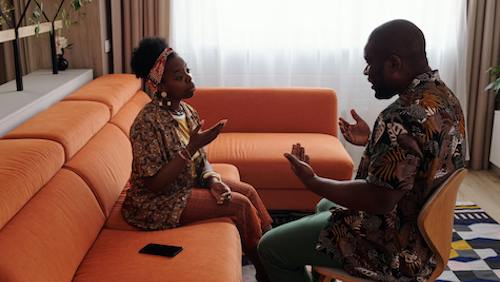Conflict is a natural and often inevitable part of any relationship, it’s how we handle those conflicts which can make all the difference. When emotions are running high, it can be easy to get caught up in the heat of the moment, become defensive or feel misunderstood, and forget how to communicate healthily. However, showing empathy, utilising emotional literacy, plus practising effective communication, can help us find solutions and better understand each other.
At The Resilience Project, we think empathy and emotional literacy play a huge part in how we manage conflict. For context, empathy is when we feel what someone else is feeling, or put ourselves in someone else’s shoes. Emotional literacy is the ability to identify and label your own emotions, and those of the people around you. In a conflict scenario, emotional literacy allows us to better express our own feelings and understand our partner’s feelings, and the empathy aspect makes us more likely to think/speak/act in a kind way. Both of these considerations seem pretty important to us, particularly when we’re trying to work through a challenge with someone we deeply care about.
While we don’t pretend to be experts on conflict management with partners, and our go-to tips are certainly not a silver bullet to every couple’s arguments, they can remind us to approach those challenges in a more empathetic and solutions-focussed way.
So, with all that being said, here are our go-to tips…
1. Take a break when emotions run high
If the conversation becomes heated or overwhelming, it’s okay to take a break and calm down before continuing the discussion. Taking a break doesn’t mean you’re avoiding the issue. More accurately, you’re giving yourselves time to process your emotions and gather your thoughts. This can be in the form of two minutes of breathing, a walk around the block or going into the next room. Let your partner know you need a moment, and agree to come back to the conversation later when you’ve both had time to cool down and reflect. This also helps prevent either of you saying something you might regret later.
2. Identify and label your emotions
Before you can communicate your feelings to your partner, you need to be able to understand them yourself. Take a moment to identify and label your emotions. Look at what you’re feeling and why. Are you feeling angry, hurt, or frustrated? Once you’ve identified your emotions, you can communicate them and their cause more clearly to your partner. For example, instead of saying, “You make me so mad,” try, “I’ve been feeling hurt when you do X.”
3. Practise active listening
Active listening involves paying attention to your partner and understanding their point of view. When your partner is speaking, give them your full attention and avoid interrupting. Once they’ve finished speaking, summarise what they’ve said to ensure you’ve understood their perspective. This will minimise room for misunderstanding and show your partner you are listening and you value their thoughts and feelings. Remember, during these confrontations, your thoughts and feelings are just as valid as each other’s, and more often than not, you are actually on the same team (not fighting against each other as it might outwardly appear). Active listening is the key to remembering this.
4. Use “I” statements
When communicating your feelings, it’s essential to use “I” statements instead of focusing on “you”. For example, instead of saying, “You never listen to me,” you could try “I feel unheard when you interrupt me.”. This puts the focus on how you are feeling and avoids your partner feeling blamed or attacked. This should help reduce the instinct to be defensive, and create a more open space for conversation.
5. Find common ground
During a conflict, it’s easy to focus on your differences. However, it’s crucial to find common ground and work towards a solution together. If you stop trying to “win” the argument, and focus on identifying what you both agree on, you can find a compromise which satisfies both parties. This will help both of you feel heard, and your needs met.
It can be challenging to show empathy and practise emotional literacy when we are experiencing conflict with a partner, however working together can help us build stronger connections and be powerful for our relationship’s growth.
—
While there’s a level of conflict which can be normal in a partnership, if you feel you are experiencing heightened conflict, please seek out professional support. If you are ever in immediate danger, call 000 for Police and Ambulance help.
The Resilience Project is not a licensed mental health service and is not a substitute for professional mental health advice, treatment or assessment. The advice given in this article is general in nature.
For more on active listening, explore our article ‘How to be a good listener‘.
For confidential information, counselling and support services, go to https://www.1800respect.org.au
Sources:
“I” statements – https://www.ncbi.nlm.nih.gov/pmc/articles/PMC5961625/
Labelling emotions – Putting Feelings Into Words: Affect Labeling as Implicit Emotion Regulation






